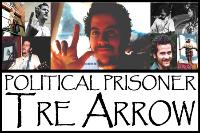Saturday, March 31
Illinois Court's Failure to Show Jury Proof of Federal Tax Law Prompts Acquittal on State Tax Fraud Charges
 In May 2000, a 12-member jury in Logan County, Illinois weighed the evidence from a legal defense team and Illinois state prosecutors. After jurors deliberated just four hours, they ruled that Whitey Harrell, 62, a U.S. Postal Service rural mail carrier, was innocent of all of the four criminal felony charge state prosecutors filed against him for "willful failure to file an Illinois State Income Tax form."
In May 2000, a 12-member jury in Logan County, Illinois weighed the evidence from a legal defense team and Illinois state prosecutors. After jurors deliberated just four hours, they ruled that Whitey Harrell, 62, a U.S. Postal Service rural mail carrier, was innocent of all of the four criminal felony charge state prosecutors filed against him for "willful failure to file an Illinois State Income Tax form."In 1993, Harrell filed an unsuccessful lawsuit against the Internal Revenue Service in a U.S. Court of Appeals, claiming the agency illegally garnished his wages for failing to pay his federal income taxes for 1985 and 1986.
Harrell's 2000 Illinois state tax case decision appeared in a Logan County newspaper, which remains archived at FreeRebulic.com:
Lincoln - Gaylon "Whitey" Harrell of rural Latham was acquitted by a 12 person jury of the 4 count criminal felony charges of willful failure to file an Illinois State Income Tax form.
The actual trial began on Wednesday May 24th in the Logan County Circuit Court room, presided over by Senior Judge David "Slick" Coogan ("Slick is how the judge identifies himself) and closed on Friday after four hours of deliberation when the jury returned with four consecutive "not guilty" verdicts.
"We were in a heated debate" reported one unnamed juror, "but when the court refused, after our specific written request, to furnish us copies of the actual statutes, (that imposed the obligation on the defendant,) it didn't take long for all of us to see that something was wrong with the State's case.
"That was not all the court refused to let the jury see," added Jerry Barringer, Harrell's attorney. "The court, at the request of the Illinois State's attorney, denied the jury access to evidence that already had been introduced and accepted." "Astoundingly, even the Bill of Indictment was denied to the jury." chimed in Barringer's legal assistant Lindsey Springer, "Also denied were jury instructions sanctioned by the Supreme Court and even a VCR recorder to play the video tape that Whitey had made of his meeting with the CID agent."
"I've seen a lot of tyranny in the courts, but never anything so blatent as what I saw here over the last two days," added Bob Minark, an Indiana friend of Harrell's.
The 4 criminal felony charges had been brought against Harrell in 1997 and just came to trial this past week. Harrell had submitted numerous motions in a case that saw both assigned judges and assigned state's attorneys resign or recuse themselves. All Harrell's motions were denied.
The case started back in early 1997 when Harrell was approached by Illinois Dept. of Revenue Criminal Investigation Division (CID) agent Robert Craner, who asked him for an interview. The testimony was that Harrel refused until he had witnesses present and a video camera set up at the local library where he later video taped a 45 minute meeting with Craner. On the video, which was shown to the jury at the trial, Harrell specifically pointed out that he could find no section of the Illinois statutes that obligated him to file an Illinois income tax return. He presented Craner with numerous documents which he identified as outlines of statutes and regulations and "administrative code" which he said he searched to no avail in finding any obligation that would apply to him. Craner accepted the documents.
The tape showed that Craner promised Harrell at least five different times, to produce the statutes that made Harrell liable and get answers to Harrell's questions.
The testimony later showed that Craner didn't do that and instead = went back to the Grand Jury to testify that Harrell was a resident of Logan County who failed to file Illinois state income tax forms. Unbeknownst to Harrell, at the time of the interview, Craner was also acting as a Grand Jury investigator. "He never told me," said Harrell, "He never read me a Miranda warning. He just promised to get me the information, but instead went back to the Grand Jury to get an Indictment."
Grand Jury Transcripts show that Craner testified that Harrell, at the library meeting, had nothing to offer in his defense of why he didn't file a tax return, but the video tape brought Craner's credibility into serious question.
Harrell testified in his own defense and verified his many efforts to obtain the law that made him liable for the income tax or how his activity was privileged. The prosecution brought out on cross examination that Harrell had filed many law suits in the past and that those suits were dismissed in both the state and federal courts.
In an attempt to prove knowledge, the state also elicited that Harrell had previously filed tax returns previously. Harrell's Attorney Barringer likened that to believing in Santa Claus when you were a child and then gaining knowledge of the fact that Santa Claus is a fantasy as you got older and wiser.
Barringer's questioning of Agent Craner as to his belief in Santa Claus brought an objection from the State's attorney which was sustained by the judge without any recognition of humor.
Harrell, 62, had worked for the United States Post Office as a rural mail carrier and also received a pension from Caterpillar from where he retired in 1990.
Asked if his case will set a precedent, Harrel said, "Legally, No, but I certainly hope it sets the precedent that more people question the loss of their rights and property whenever government claims its the law. I feel sure this jury will be thinking = twice."
Interestingly, even after the specific request of the jury, neither the state or the court ever did produce any statute showing Harrel had any obligation. "We don't have anything to say at this time other than Mr. Harrell was very lucky and we will be watching his activities carefully," stated an assistant State's Attorney who asked not to be identified.
Harrel plans to keep up his efforts to expose, what he says, is the one of the largest frauds ever committed on the people of Illinois.
"Al Capone couldn't hold a candle to these guys," Harrell commented when talking about the State's claim of a requirement for wage earners and independent contractors to file a state income tax form.
Harrell's bail bond has been released and the funds obtained from Harrell to guarantee the bond will be returned. No further court actions are pending against Harrell at this time, but Harrell anticipates further actions by himself against both the state Department of Revenue and the federal Internal Revenue Service.
In the clip below, Marcy Brooks tells filmmaker Aaron Russo some of the startling revelations that surfaced as she and fellow jurors heard the evidence presented in Harrell's tax case.Postscript: Part III of MM's "Tax Day Honesty" series addressing the alleged illegal ratification in 1913 of the 16 Amendment to the U.S. Constitution--the "Income Tax" amendment--will appear, appropriately, April 1, April Fool's Day.
A month after Harrell's acquittal, Marcy Brooks spoke about Harrell's trial at a "Legality of Income Conference." A 14-minute video-part 1 and part 2--of her presentation is available for online viewing at YouTube.com.
And this note from the link to those clips: "A complete copy of the June 29, 2000, Legality of Income Tax Conference video may be obtained at the We the People Foundation Web site, by email at acta@capital.net or by telephone at (518) 656-3578." Ordering info also may be available at www.CuriousEvidence.com.











